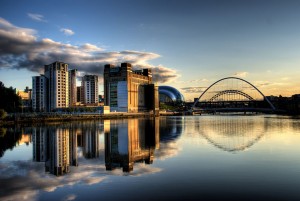
Quayside of the River Tyne with the Bridges connecting Newcastle and Gateshead.
Source: Wikimedia Commons
Rivers are at the heart of defining the identity and lifestyle of many cities around the world, and that is nowhere stronger than in Newcastle on Tyne in the Northeast of England on the banks of the River Tyne. The people who live on the banks of the Tyne are fiercely proud of their river. Once the river was an industrial powerhouse of the British Empire, and by the 1880s the Port of Tyne exported the most coal in the world, and the river was amongst the world’s largest shipbuilding and ship-repairing centres.
There has been much consideration of how the River Tyne has shaped Tyneside and Tynesiders, but very little appreciation of the enormous extent to which people have shaped the river. To bear out this invisible history of the river, historian Leona Skelton, a Post-Doctoral Research Assistant at the University of Bristol, has worked on a research project that challenges us to think from a river’s perspective and to include in our river histories the flow pathways which rivers ‘wanted’ to follow, regardless of the changes that humans have forged upon the river. On episode 69 of the Exploring Environmental History Podcast Leona challenges us to look at a river as an historical actor with its own agency.
Leona’s Research was part of the British Arts and Humanities Research Council funded environmental history initiative “The Power and the Water: Connecting Pasts with Futures”, that focuses on environmental connectivities that have emerged in Britain since industrialisation.
Further reading and resources
Archer, D., Tyne and Tide: A Celebration of the River Tyne (Ovingham: Daryan Press, 2003)
Chaplin, M., Tyne View: A Walk around the Port of Tyne (2012).
Charlton, B., Upper North Tynedale: A Northumbrian Valley and its People (Northumbrian Water, 1987).
Cioc, Mark, and ebrary Academic Complete. The Rhine: An Eco-biography, 1815-2000 (Seattle: University of Washington Press, 2002).
Levine, D., and Wrightson, K., The Making of an Industrial Society: Whickham, 1560-1765 (Oxford: Oxford University Press, 1991)
Mah, A., ‘Memory, Uncertainty and Industrial Ruination: Walker Riverside, Newcastle on Tyne’, International Journal of Urban and Regional Research, vol. 34, no. 2 (2010), pp. 398-413
Marshall, M., Tyne Waters: A river and its salmon (London: H F & G Witherby, 1992)
Rennison, R., Water to Tyneside: A History of the Newcastle and Gateshead Water Company (Newcastle: Newcastle & Gateshead Water Company, 1979)
Music credits
“So Cold” by @nop, available from ccMixter
“Clash” by zorza, available from ccMixter
“Healing” by Stefan Kartenberg, available from ccMixter



December 18, 2015 at 12:44 am
Splendid podcast and film, Jan and Leona (and you’re forgiven for not including Liverpool at the mouth of the Mersey among the world’s greatest river cities…).
The place of shipbuilding in the waterscape of the Tyne and the identity of Tyneside will be explored further in a documentary film about the post-industrial landscape of Tyneside entitled ‘Tyne: A Brief History of Ruin’, that former Bristol University History student (and Severn Bore surfer) Hunter Charlton is currently making with the support of the ‘Power and Water’ project. Based on interviews with local residents, shipbuilders and scholars and including archival footage from the North East Film Archive (Teesside University, Middlesbrough), this 17-19-minute film is an outgrowth of Hunter’s final year dissertation, ‘Landscape and Change: Shipbuilding and Identity on the Tyne’, which was selected as one of the Best History Dissertations of 2015 and can be accessed here:
http://www.bristol.ac.uk/media-library/sites/history/documents/dissertations/2015charlton.pdf